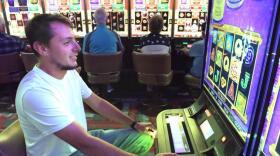Legislation that would bring Keno to an estimated 250 bars and restaurants would, for the first time, establish a program to treat gambling addiction in New Hampshire.
An amendment to HB 485 would set aside 1 percent of the sales from Keno - about $435,000 - to the state Department of Health and Human Services for education, treatment and prevention services. William Butynski, D-Hindale, who proposed the amendment, says it’s time for lawmakers to recognize that even state-sponsored gambling such as the lottery can cause problems for a small percentage of people who play.
“Right now, the state of New Hampshire does absolutely nothing,” Butynski said. “It’s embarrassing, it’s discouraging and, frankly, it’s inappropriate.”
State health officials have explored the need for problem-gambling services during numerous debates over casinos. A DHHS presentation to the Gaming Study Commission in March 2010 estimated that about 20,000 Granite Staters already show signs of a gambling disorder, with some 6,000 in need of clinical treatment for pathological gambling.
Related Story: Keno: The Next Big Bet for the NH Lottery?
Keno is often criticized as an especially addictive game, although there is evidence - anecdotal and scientific - that it poses no more risk than some other types of gambling.
Two studies published in the 1990s of Quick Draw, the New York State Lottery’s version of Keno, found that the prevalence of problem gambling was greater among Quick Draw players than other weekly lottery players. The studies have been cited in numerous media accounts to assert that, as the Boston Globe put it in a 1997 series on the Massachusetts Lottery, Keno’s “rapid, continuous pace fosters addiction.”
But the author, Rachel Volberg, who has been researching the epidemiology of problem gambling since the 1980s, said the studies were “cross-sectional snapshots” of Quick Draw players and did not establish that a causal relationship between keno and gambling addiction.
Volberg, an associate professor at the University of Massachusetts-Amherst School of Public Health and Health Services, said there is very little scientific research on Keno and whether adding it to a state’s gaming mix leads to more gambling addicts.
“There are a lot of different ways to think about riskiness of gambling activities, and one dimension is event frequency, where the faster a game can be played, the riskier it is,” she said. “Keno being played every five minutes may be riskier than a jackpot game once or twice a week or even a daily game. But it’s probably less risky than scratch tickets. You can scratch a lot of tickets in 5 minutes.”
Indeed, gambling treatment providers say people who seek help are much more likely to be addicted to scratch tickets, which New Hampshire first introduced in 1975.
Dot Duda is director of Outpatient Psychiatry and the Prevention and Recovery Center at Mount Auburn Hospital, Massachusetts’ largest gambling treatment program. She said a quick review of recent case files showed scratch tickets and sports betting were cited much more often by patients. “We don’t see a lot of Keno,” she said.
Researchers say the science of gambling disorders is still relatively new. Just last year, the American Psychiatric Association reclassified problem gambling from an impulse-control disorder to an addiction disorder, alongside alcohol and drugs.
Accordingly, the relationship between the types of games people play and problem gambling needs more study, said Debi LaPlante, the director of the Division on Addiction at the Cambridge Health Alliance. While there is a “popular assumption” that increasing gambling opportunities leads to an increase in gambling problems, LaPlante said, the research is far from conclusive.
Moreover, she said, looking for risk in specific games could overlook other potential factors, such as substance abuse and other mental health problems.
“The issue for me is that focusing on one of the contributing factors to the exclusion of others could be misleading and misdirect attention to too great an extent,” she said. “Gambling games are essential to the development of problems, so I am not saying that they are unimportant, just that the bigger context tells a more complete story.”
Duda, a Granite State resident who is helping establish the New Hampshire Council on Compulsive Gambling, said committing funds for education, prevention and treatment will help policymakers get a handle on a widely misunderstood problem.
"This is a hidden addiction," she said, "but neither the state nor other people see it as an addiction. Even problem gamblers are very reluctant to get into treatment. They think it's a matter of willpower.
"That's why there is so much awareness that needs to be done, so that people can see the signs - what is problem gambling, what is social gambling and how do you know when you've stepped over the line?"






